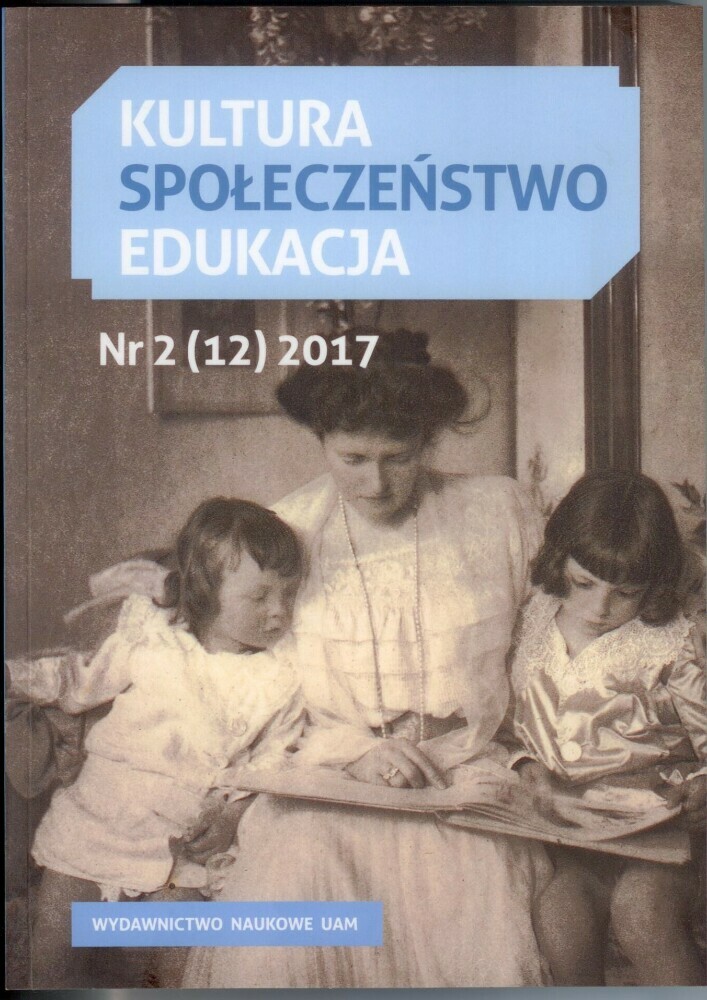Abstrakt
Assuming the ontological understanding of rhetoric, as proposed by Ernesto Laclau, the paper explores the language of educational theories in their dimensions significant in terms of the discursive construction of societies. The tropes and rhetorical strategies identified in J.J.Rousseau’s works are assumed as the point of departure for the crystallization of the modern discourse of education, here understood as an ontologically indispensable element of the political.
Bibliografia
Agamben G. (2007). Profanations. New York.
Baczko B. (1964). Rousseau: Samotność i wspólnota. Warszawa.
Baker B. (2010). In Perpetual Motion. Theories of Power, Educational History, and the Child. New York, Washington D.C., Bern, Franfurt am Mein, Berlin, Brussels, Vienna, Oxford.
Biesta G. (2013). Time out: can education do and be done without time? [W:] T. Szkudlarek (red.). Education and the Political. New Theoretical Articulations. Rotterdam, Boston, Taipei.
Biesta G. (2014). The Beautiful Risk of Education. New York.
Biesta G., Säfström C.A. (2011). A Manifesto for education. „Policy Futures in Education” 9(5).
Bingham Ch. (2010). Under the name of method: On Jacques Rancière’s presumptive tautology. [W:] C. Ruitenberg (red.). What do Philosophers of Education do (And how they do it)?. Hoboken.
Bingham Ch., Biseta G. (2010). Jacques Rancière: Education Truth, Emancipation. New York.
Carusi F.A. (2011). The Persistence of Policy: A Tropological Analysis Of Contemporary Education Policy Discourse in the United States. „Scholar Works”. https://scholarworks.gsu.edu/eps_diss/82/, dostęp: 29.11.2015.
Carusi F.A. (2017). Why Bother Teaching? Despairing the Ethical Through Teaching that Does Not Follow, „Studies in Philosophy and Education”. doi:10.1007/s11217-017-9569-0.
Delors J.,(red.). (1998). Edukacja – jest w niej ukryty skarb. Warszawa.
Hegel G.W.F. (1990). Encyklopedia nauk filozoficznych. Warszawa.
Hessen S. (1997). O sprzecznościach i jedności wychowania. Warszawa.
Inston K. (2010). Rousseau and Radical Democracy. London and New York.
Jessop B. (2007). Knowledge as a fictitious commodity: Insights and limits of a Polanyian analysis. [W:] A. Buiğra, K. Ağartan (eds.) Reading Karl Polanyi for the 21st Century: Market Economy as a Political Project. Basingstoke.
Laclau E. (2009). Rozum populistyczny. Przekład zespołowy pod kier. T. Szkudlarka. Wrocław.
Laclau E. (2014). The Rhetorical Foundations of Society. London.
Mannheim K. (2008). Ideologia i utopia. Przeł. J. Miziński. Warszawa.
Masschelein J., Simons M. (2013). In Defence of the School: A Public Issue. Leuven.
Osterwalder F. (2012). The Modern Religious Language of Education: Rousseau’s Emile. „Studies in Philosophy and Education” 31.
Proctor R.N., Schiebinger L. (red). (2008). Agnotology: The Making and Unmaking of Ignorance. Stanford.
Rancière J. (1991). The Ignorant Schoolmaster. Five Lessons in Intellectual Emancipation. Stanford.
Roberts J., Armitage J. (2008). The Ignorance Economy, „Prometheus” 26, 4.
Rousseau J.-J., (1762), Émile ou de l’éducation: livres I, II et III. http://classiques.uqac.ca/classiques/Rousseau_jj/emile/emile_de_education_1_3.pdf.
Rousseau J.-J. (1966). Uwagi o rządzie polskim. [W:] Umowa społeczna oraz Uwagi o rządzie polskim. Przedmowa do „Narcyza”. List o widowiskach. List o opatrzności. Listy moralne. List do arcybiskupa de Beaumont. Listy do Malesherbesa. Przekład B. Baczko, W. Bieńkowska, M. Pawłowska, A. Peretiatkowicz, J. Rogodziński, M. Staszewski, B. Strumiński. Warszawa.
Rousseau J.-J. (2007). Umowa społeczna. Przekład A. Peretiatkowicz. Kęty.
Rousseau J.-J., Emil, czyli o wychowaniu. Polska Biblioteka Internetowa (epub), b.r.w.,.
Scott J. (1994) Politics as the imitation of the divine in Rousseau’s Social Contract. “Polity” XXVI, pp. 473–501.
Starego K. (2016). Odmowa teraźniejszości, czyli o odobywatelnianiu dzieci i udziecinnianiu obywateli. „Teraźniejszość – Człowiek – Edukacja” 19, 3(75).
Szkudlarek T. (1995). Pedagogizm i pedagogika. [W:] J. Hejnicka-Brzezwińska (red.), Racjonalność pedagogika. Bydgoszcz.
Szkudlarek T. (2005). On nations and children: Rousseau, Poland, and European Identity. „Studies in Philosophy and Education”, 24. pp.19–38.
Szkudlarek T. (2007). Empty signifiers, politics and education. „Studies in Philosophy and Education” 26 (3).
Szkudlarek T. (2011). Semiotics of identity. education and politics. „Studies in Philosophy and Education” 30 (2).
Szkudlarek T. (2013). Identity and normativity: politics and education. [W:] T. Szkudlarek (red.). Education and the Political. New Theoretical Articulations. Rotterdam, Boston & Taipei.
Szkudlarek T. (2016). Retoryka tożsamości. [W:] Przesilenie. Nowa kultura polityczna pod red. J. Kołtana. Gdańsk.
Szkudlarek T. (2017). On The Politics of Educational Theory. Rhetoric, theoretical ambiguity, and the construction of society. London and New York.
Tröhler D. (2014). Between universally claimed theory and a common understanding: Theoretical knowledge in education. [W:] G. Biesta, G. Allen, R. Edwards (eds.). Making a Difference in Theory. The Theory Question in Education and the Education Question in Theory. London and New York.
Žižek S. (1994). Identity and its vicissitudes: Hegel’s ‚Logic of Essence’ as theory of ideology. [W:] E. Laclau (ed.). The Making of Political Identities. London.
Licencja
Prawa autorskie (c) 2019 Tomasz Szkudlarek

Utwór dostępny jest na licencji Creative Commons Uznanie autorstwa – Bez utworów zależnych 4.0 Międzynarodowe.
